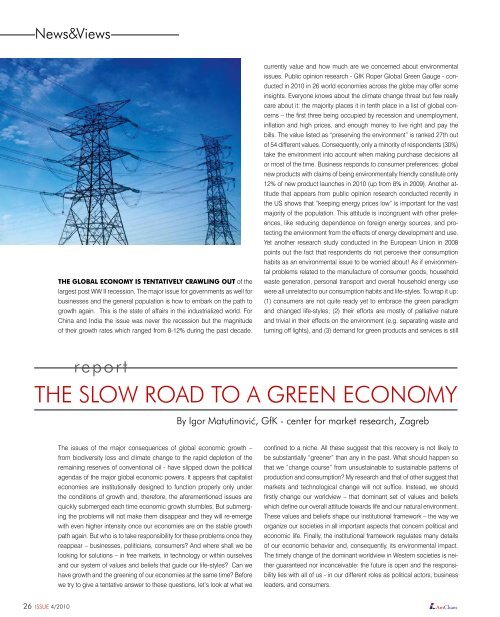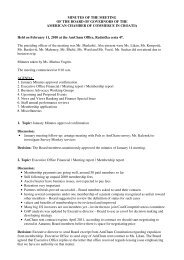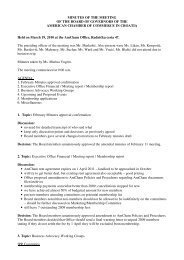Improving the Investment Climate in Croatia ⢠Evening for Safe Steps ...
Improving the Investment Climate in Croatia ⢠Evening for Safe Steps ...
Improving the Investment Climate in Croatia ⢠Evening for Safe Steps ...
- No tags were found...
Create successful ePaper yourself
Turn your PDF publications into a flip-book with our unique Google optimized e-Paper software.
News&ViewsThe global economy is tentatively crawl<strong>in</strong>g out of <strong>the</strong>largest post WW II recession. The major issue <strong>for</strong> governments as well <strong>for</strong>bus<strong>in</strong>esses and <strong>the</strong> general population is how to embark on <strong>the</strong> path togrowth aga<strong>in</strong>. This is <strong>the</strong> state of affairs <strong>in</strong> <strong>the</strong> <strong>in</strong>dustrialized world. ForCh<strong>in</strong>a and India <strong>the</strong> issue was never <strong>the</strong> recession but <strong>the</strong> magnitudeof <strong>the</strong>ir growth rates which ranged from 8-12% dur<strong>in</strong>g <strong>the</strong> past decade.currently value and how much are we concerned about environmentalissues. Public op<strong>in</strong>ion research - GfK Roper Global Green Gauge - conducted<strong>in</strong> 2010 <strong>in</strong> 26 world economies across <strong>the</strong> globe may offer some<strong>in</strong>sights. Everyone knows about <strong>the</strong> climate change threat but few reallycare about it: <strong>the</strong> majority places it <strong>in</strong> tenth place <strong>in</strong> a list of global concerns– <strong>the</strong> first three be<strong>in</strong>g occupied by recession and unemployment,<strong>in</strong>flation and high prices, and enough money to live right and pay <strong>the</strong>bills. The value listed as “preserv<strong>in</strong>g <strong>the</strong> environment” is ranked 27th outof 54 different values. Consequently, only a m<strong>in</strong>ority of respondents (30%)take <strong>the</strong> environment <strong>in</strong>to account when mak<strong>in</strong>g purchase decisions allor most of <strong>the</strong> time. Bus<strong>in</strong>ess responds to consumer preferences: globalnew products with claims of be<strong>in</strong>g environmentally friendly constitute only12% of new product launches <strong>in</strong> 2010 (up from 8% <strong>in</strong> 2009). Ano<strong>the</strong>r attitudethat appears from public op<strong>in</strong>ion research conducted recently <strong>in</strong><strong>the</strong> US shows that “keep<strong>in</strong>g energy prices low” is important <strong>for</strong> <strong>the</strong> vastmajority of <strong>the</strong> population. This attitude is <strong>in</strong>congruent with o<strong>the</strong>r preferences,like reduc<strong>in</strong>g dependence on <strong>for</strong>eign energy sources, and protect<strong>in</strong>g<strong>the</strong> environment from <strong>the</strong> effects of energy development and use.Yet ano<strong>the</strong>r research study conducted <strong>in</strong> <strong>the</strong> European Union <strong>in</strong> 2008po<strong>in</strong>ts out <strong>the</strong> fact that respondents do not perceive <strong>the</strong>ir consumptionhabits as an environmental issue to be worried about! As if environmentalproblems related to <strong>the</strong> manufacture of consumer goods, householdwaste generation, personal transport and overall household energy usewere all unrelated to our consumption habits and life-styles. To wrap it up:(1) consumers are not quite ready yet to embrace <strong>the</strong> green paradigmand changed life-styles; (2) <strong>the</strong>ir ef<strong>for</strong>ts are mostly of palliative natureand trivial <strong>in</strong> <strong>the</strong>ir effects on <strong>the</strong> environment (e.g. separat<strong>in</strong>g waste andturn<strong>in</strong>g off lights), and (3) demand <strong>for</strong> green products and services is stillreportThe Slow Road to a Green EconomyBy Igor Matut<strong>in</strong>ović, GfK - center <strong>for</strong> market research, ZagrebThe issues of <strong>the</strong> major consequences of global economic growth –from biodiversity loss and climate change to <strong>the</strong> rapid depletion of <strong>the</strong>rema<strong>in</strong><strong>in</strong>g reserves of conventional oil - have slipped down <strong>the</strong> politicalagendas of <strong>the</strong> major global economic powers. It appears that capitalisteconomies are <strong>in</strong>stitutionally designed to function properly only under<strong>the</strong> conditions of growth and, <strong>the</strong>re<strong>for</strong>e, <strong>the</strong> a<strong>for</strong>ementioned issues arequickly submerged each time economic growth stumbles. But submerg<strong>in</strong>g<strong>the</strong> problems will not make <strong>the</strong>m disappear and <strong>the</strong>y will re-emergewith even higher <strong>in</strong>tensity once our economies are on <strong>the</strong> stable growthpath aga<strong>in</strong>. But who is to take responsibility <strong>for</strong> <strong>the</strong>se problems once <strong>the</strong>yreappear – bus<strong>in</strong>esses, politicians, consumers? And where shall we belook<strong>in</strong>g <strong>for</strong> solutions – <strong>in</strong> free markets, <strong>in</strong> technology or with<strong>in</strong> ourselvesand our system of values and beliefs that guide our life-styles? Can wehave growth and <strong>the</strong> green<strong>in</strong>g of our economies at <strong>the</strong> same time? Be<strong>for</strong>ewe try to give a tentative answer to <strong>the</strong>se questions, let’s look at what weconf<strong>in</strong>ed to a niche. All <strong>the</strong>se suggest that this recovery is not likely tobe substantially “greener” than any <strong>in</strong> <strong>the</strong> past. What should happen sothat we “change course” from unsusta<strong>in</strong>able to susta<strong>in</strong>able patterns ofproduction and consumption? My research and that of o<strong>the</strong>r suggest thatmarkets and technological change will not suffice. Instead, we shouldfirstly change our worldview – that dom<strong>in</strong>ant set of values and beliefswhich def<strong>in</strong>e our overall attitude towards life and our natural environment.These values and beliefs shape our <strong>in</strong>stitutional framework – <strong>the</strong> way weorganize our societies <strong>in</strong> all important aspects that concern political andeconomic life. F<strong>in</strong>ally, <strong>the</strong> <strong>in</strong>stitutional framework regulates many detailsof our economic behavior and, consequently, its environmental impact.The timely change of <strong>the</strong> dom<strong>in</strong>ant worldview <strong>in</strong> Western societies is nei<strong>the</strong>rguaranteed nor <strong>in</strong>conceivable: <strong>the</strong> future is open and <strong>the</strong> responsibilitylies with all of us - <strong>in</strong> our different roles as political actors, bus<strong>in</strong>essleaders, and consumers.26 ISSUE 4/2010













